"Lighthouse" is a minimalistic film that will drive you crazy
Educational Program Cinema / / December 30, 2020
The bearded Willem Dafoe and the almost unrecognizable Robert Pattinson stare grimly from the black and white poster. It is director Robert Eggers who returned almost five years later with a second feature film reimagining the horror genre.
In the already distant 2015 in “Witch»He showed that there was still room for art-house in the horrors by filming the picture in natural light and leaving the audience to wonder: what was real on the screen?
In "Lighthouse" Eggers, having already strengthened in the full-length cinema and having got two amazing actors for the main roles, decided on an even bolder move. As if he decided to find those minimal components that create an atmosphere of mysticism and horror on the screen.
As a result, "Lighthouse" literally pulls into a state of madness, although at first glance, nothing happens in it.
The film from which everything was thrown out. Even the plot
Former woodcutter (Robert Pattison) gets a job as an assistant lighthouse keeper (Willem Dafoe). The middle-aged boss is distinguished by a rather nasty character and does not allow his partner to approach the main part of the work - controlling the lamp.
He only forces a colleague to sweep floors, paint walls, and do other mundane work. Gradually, the heroes begin to communicate, but then a storm occurs, which greatly affects their lives.
In general, this is all that can be said about the plot of the film. A couple of mystical moments (or just crazy fantasies of the characters) in the first half of the story only set off the everyday life of the heroes. Most of the time they are just talking, doing mundane things, or getting drunk. Even their names are called almost in the middle of the picture.
But getting rid of the dynamics, Eggers went even further. He reduced the cast as much as possible: only two actors play in "Mayak", with the exception of the short appearance of the model Valeria Karaman, and even then in a very specific way.
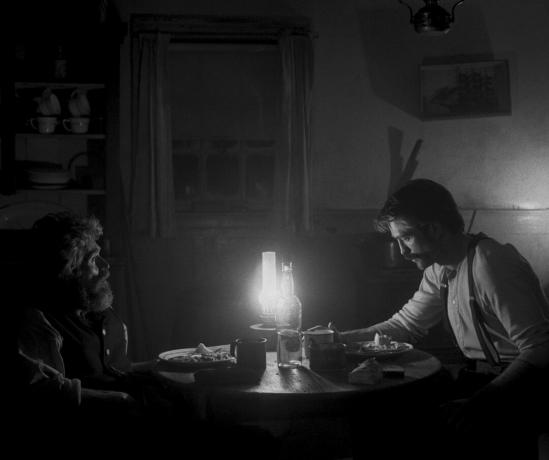
Then the director removed the color, making the film a semblance black and white silent pictures. Moreover, the contrasting selection of characters makes even a natural background drawn. And instead of the soundtrack, dark ambient sounds constantly, often turning into the hum of a lighthouse.
At the same time Eggers began to reduce the frame. "Mayak" was filmed in a very old format - 1.19: 1, that is, the picture looks much narrower than in most modern films.
This further enhances the retrokino feeling. And at the same time it makes you watch only the characters themselves, without being distracted by the background - the limited picture does not show anything superfluous. On top of that, the space is further narrowed by hatches, doors or corridors. After a while, the viewer will even feel like a voyeur constantly spying on the characters from around the corner.
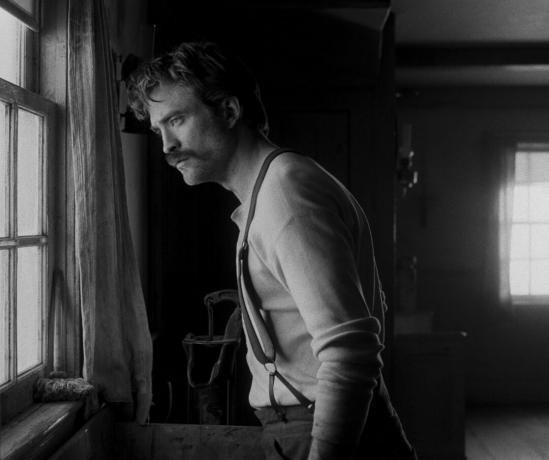
And here the question may arise: is there anything left in the film that can attract attention, let alone create an atmosphere? As it turned out, yes!
Film test for actors and spectators
Eggers uses all of these techniques for two main purposes. First, he wants to scare the viewer. And secondly, to confuse. But "Lighthouse" can hardly be called horror in its traditional sense. And with this, the indignation of some spectators will certainly be associated.
Similar "mom!"Darren Aronofsky was once called a horror film at the box office, and Drive Refna served as a fighter. As a result, many left the sessions dissatisfied, having received not funny entertainment, but serious drama.
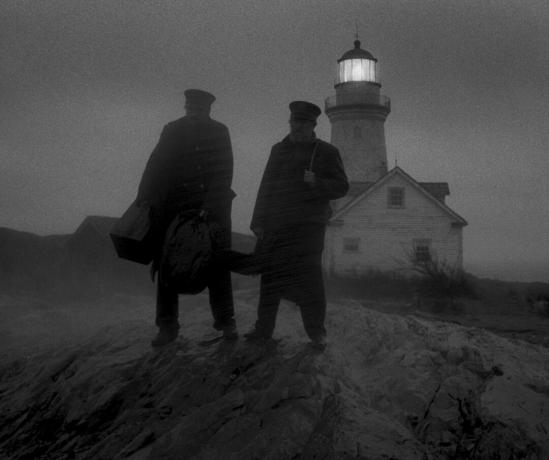
"Lighthouse" frightens with non-jumping monsters and loud sounds. Like "Solstice"Ari Astera or" The Witch "of the same Eggers, he engages with the very feeling of madness.
But it takes full commitment. Moreover, both from the actors and, oddly enough, from the viewer.
Robert Pattinson told Robert Pattinson's Revolting 'Lighthouse' Shoot Included Eating Mud, Pissing Himselfthat on the set of this picture he really got drunk, ate dirt and peed in his pants, and in one of the scenes he deliberately tried to induce real vomiting in himself. In general, in terms of various physiological sounds, only "Man - Swiss Knife" can compete with "Mayak" (fortunately, Eggers' film loses in this regard).
The inadequacy of what is happening is felt even in the black and white picture. Against the backdrop of Dafoe, who looks light and natural, Pattinson's character sometimes looks too grotesque, again resembling silent movie characters. Horror goes side by side with comedy here. Yet both heroes remain alive.
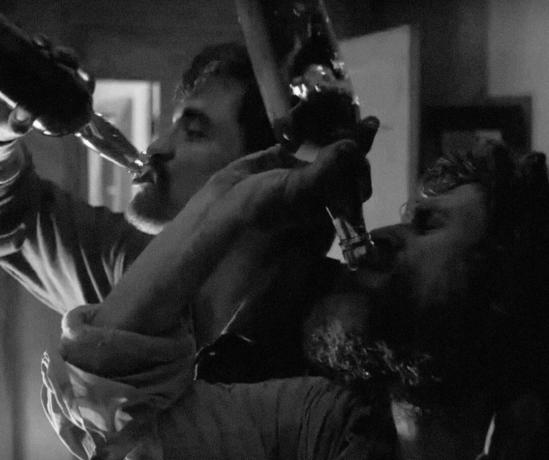
They usually do not play so stupidly and awkwardly, here you just need to fully get used to the image. And soon it seems that on the screen there really is a caretaker who has lost his mind and his drunken assistant. And that's when the real drama begins to be felt in their communication.
As for the desire to confuse, here the director acts even more rudely. He simply refuses to explain any part of the plot. For numerous references to mythology, religion, paintings of a century ago, Lovecraft and all the same "Witch" is hidden pure chaos.
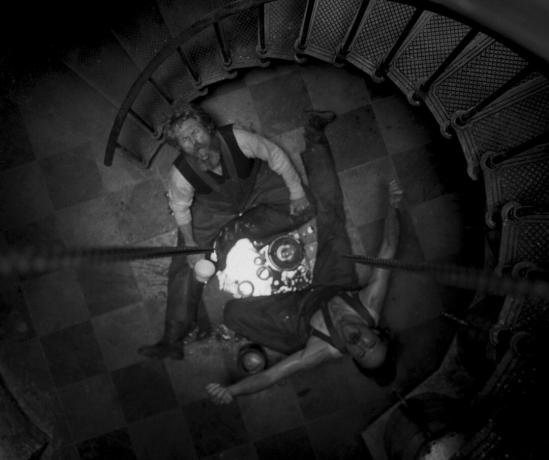
Even the already mentioned "mom!" against the background of "Mayak" it seems more unambiguous. Here, the viewer is not just given the right to decide what it all meant. He is forced to ask questions and then answer them himself.
After all, the heroes constantly lie to each other. Their names and biography details change. Then mysticism begins, or maybe just hallucinations from alcohol. Later, doubts arise about the very passage of time.
And at some point, each viewer will inevitably come to the idea that everything that happens in general is an obsession.
Any viewer will have to explain these points on their own. And depending on the answers, he will make his "Lighthouse": a horror film, drama, comedy or philosophical parable.
Movie that you may not like. And that's ok
But any mythology or religion can exist only if there are believers in it. And so Eggers' painting will only work for those who accept the rules of the game and voluntarily agree to pass this test.
Skeptics may well accuse him of empty formalism. It may even be said that Eggers is trying too hard to please critics, hiding the lack of thoughts behind incomprehensible allegories and famous actors.
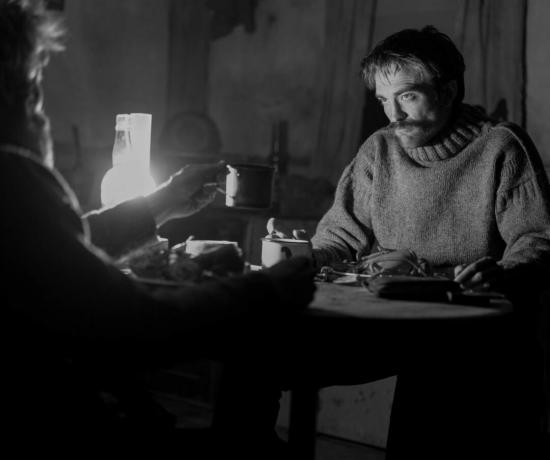
But in reality it is difficult to find a picture that does not try to please the viewer just as much. The director does not try to evoke positive emotions at all, but only offers to look into a hidden and very gloomy world.
And it is much more important when watching not so much to follow the plot lines as to try to feel what is happening on the screen yourself.
This is what you need all the dirt, gusty wind, buzzing and insanely annoying seagulls. And that's why there are so many everyday things in the film, unpleasant physiology and swearing.
It is not for nothing that the viewer observes so often “from around the corner”. Gradually it becomes clear that he is the third full-fledged participant in the action, who must figure out what is happening. And while skeptics will look for inconsistencies, those who believe in this story will widen their eyes and begin to appear a slightly insane smile from each new oddity on the screen.
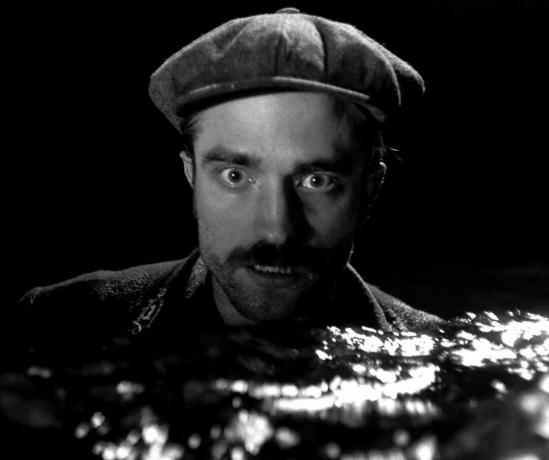
And in the finale, you don't even want to say anything, much less argue. Just breathe and rush to re-read the whole mythology, from Prometheus to St. Elmo, hoping that this will somehow clarify the situation, and secretly realizing the futility of the idea.
"Lighthouse" is one of those films that are difficult to discuss. It's even impossible to spoil it, because it's not the plot that matters. And everything written above can be attributed to both the advantages of the picture and its disadvantages. Eggers' film just rudely breaks out of the screens straight into life and hits backhand - and it will hit the target, or the blow will pass by, it depends only on the viewer.
Read also🧐
- 15 little-known detectives with a confusing plot
- 23 terribly scary movies about maniacs
- 22 horror films based on true events and popular legends
- 35 of the best thrillers you can't stop watching
- 15 psychological thrillers about personality disorders and memory problems



